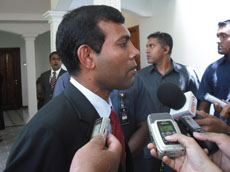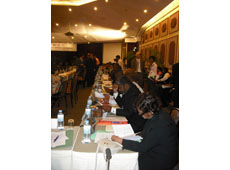President Mohamed Nasheed implored delegates at the Maldives Partnership Forum, also known as the 2010 Donor Conference, to give the Maldives “your spoonful of sugar to help the medicine go down.”
“We’re not out of the woods yet,” Nasheed told the 60 representatives of foreign countries and financial institutions participating in this year’s conference, which aims to attract foreign investment to help the government’s decentralisation plan and aid in the economic recovery of the country.
Foreign and local delegates, government officials and media crowded the meeting room for the opening ceremony which began at 10am with a recitation from the Holy Qur’an.
A video was then played for the audience which showcased the Maldives’ transition to democracy and the hope to develop the country in a sustainable manner. Five Maldivians spoke in the video and told their stories.
They included a farmer who hopes that sustainable practices will improve his crops; a woman who wants to run her own business; a man who moved his family to Malé to provide his children with better education and is having difficulty in adjusting to the problem of adequate housing; a girl who moved to Malé for her education and fell into heroin addiction; a boy who notices how the beach on his island gets smaller and how the water comes closer to his house each year.
Speakers
Minister of Foreign Affairs Dr Ahmed Shaheed was the first to address the audience. He thanked the guests for participating in the conference, adding that “you have come to the Maldives at a crucial time” in the country’s history.
“There is a lot of work to be done to build a better future together,” Shaheed said, noting the Maldives has “transformed from a repressive society to an open society.”
“It is tempting to think that the hard work is done,” he said, “but truly, it is just beginning.”
Dr Shaheed spoke of the importance of implementing human rights and democracy in the daily lives of every Maldivian, as well as in government practices.
He also hoped that democracy would not be linked to hardship and want in the country’s memory, as he acknowledged it has been a difficult transition.
Dr Shaheed wished to “bequeath our successors a country that is…. free.” He also hoped the conference would help the government in consolidating democracy through the five key areas being addressed as part of the economic reform of the country: macro-economic stability, public reform, governance and democratisation, climate change adaptation and social development.
World Bank Country Director for Sri Lanka and the Maldives, Naoko Ishii, was second to speak. She said she felt “privileged to have witnessed your journey, your very tough journey, into democracy” and made special reference to the importance of donor cooperation.
Ishii noted that many challenges still remain for the government and the people, but assured that the conference was a positive step in finding the right international partners to “shape the future of the Maldives.”
She mentioned waste disposal as an especially worrying issue, but said “there are numerous actions being taken by the government and the donors. [They] are making every effort.”
Ishii added the “Maldives can continue to take many positive steps” and mentioned that she would have liked to sign a contract under water on behalf of the World Bank.
Next to speak was Coordinator for the UN in the Maldives, Mansoor Ali. He said “we stand at a very historic juncture. Maldives is a success story of political transition.”
He wanted to present a different side of development, saying “the other side of this island paradise remains unknown for many.”
Ali focused on human rights, violence against girls and women, and the challenges being faced by Maldivian people: food shortages, rising fuel prices, the financial downturn and rising unemployment, which he said was up to 14.4%, with youth unemployment being a high concern.
He said the conference was “an unprecedented opportunity” to address these issues and to find solutions.
“The UN system is proud to have worked with [the government] in the Strategic Action Plan…which becomes a good vehicle for the sustainable development of the Maldives.”
Ali said the Maldives needs to be assisted through a comprehensive plan and thanked the donors for their vast support to the UN and the Maldivian government.

Democratic progress
President Mohamed Nasheed delivered the closing speech for the ceremony, saying Maldivians “are a diverse collection of people” who are “brought together by a common goal: we all want to see a peaceful and prosperous Maldives.”
President Nasheed said despite the “considerable progress” the country has made in the last 18 months, “there is so much work to do” since the country is still in “the infancy of democracy.”
He spoke of the transition to democracy and the issues that still need to be addressed to assure equal rights to every Maldivian.
“I don’t make a secret of my concern over the capacity of the judiciary to expend justice. Nevertheless, we respect their independence and hope that…it will grow to be a respected institution.”
He spoke of freedom of the press, noting that although the press could now “report and comment as they see fit,” he urged “certain sections of the media to be more responsible.”
He said journalists should be mindful of the consequences of their actions, and asked journalists “to try to the best of their ability to report the truth.”
He noted that the Maldives had climbed 53 places in the Reporters Without Borders’ Press Freedom Index, and warned that the government would take action against anyone who tried to undermine press freedom.
President Nasheed said “Maldivians enjoy more freedom today than at any other point in history,” and added that the government believes “people need liberty to progress.”
The president spoke of civil servants and the need to cut down on government expenditure, saying he is working with the international community “to assure we don’t spend more than we can afford.”
Politics
President Nasheed said according to the World Bank, the Maldives was facing the worst economic situation of all countries going through a democratic transition, attributing this to the fact that “we inherited an economy in crisis. We inherited a huge national debt and millions of dollars of unpaid bills.”
He said the way it worked in the past was “when international diplomats and observers come to this country, we try to patch everything up and try our best to show a clear, clean picture. But I think otherwise.”
The president said he wanted to show the donors “the worst of what we have” to give them a clear view of the situation the country is in.
“There are a lot of people who do not like the things that we are doing. But most members of the opposition are sensible and respectable politicians.”
But he criticised some members of the Dhivehi Rayyithunge Party (DRP) who this weekend were “doing their best to get arrested” and disrupt the donor conference, saying that in his mind, “violence only creates violence.”
He said he did not believe arresting DRP leaders was the solution to the recent political unrest, or to past violations of rights, adding “if we took everyone implicated in corruption and torture, we would end up arresting most of the opposition.”
“It’s time that certain politicians left the nursery and learn to grow up.”
Leader of the opposition DRP Ahmed Thasmeen Ali meanwhile wrote an open letter to delegates of the donor conference claiming that under Nasheed’s leadership, the Maldives was “sliding into political chaos and instability”.
“It is my humble request that you may please exercise the powers of your good offices to address the issues of democratic deficit in the current administration,” Thasmeen wrote. “Counsel against the efforts of the government to consolidate absolute power in their hands, and advocate for the discontinuation of their endeavors to eliminate an effective political opposition.
Climate change
As a major platform of his campaign and presidency, President Nasheed spoke to the participants of the conference on the reality of climate change and the need to take action.
“Climate change is real,” he said, “and time is of the essence and it seems we are falling behind. The world needs to go carbon neutral by mid century.”
President Nasheed said his government wants “to break the link between carbon and development,” noting that “carbon neutral development is not just possible but profitable.”
The president said donors were investing in the Maldives, despite the challenges of climate change and highly-publicised threat of submersion, “because they want to maintain, adapt, protect and uplift the country. If you want to protect something… then of course you will come and donate and you will help.”
“This is a crucial period in time. We can actually introduce adaptation and litigation measures quickly enough to save the Maldives, so I think that’s why the donors are investing,” Nasheed said.

Donor Conference
President Nasheed thanked the donors for their participation, saying it is “so important and deeply appreciated.”
He said that thanks to the transition to democracy, “I believe the Maldives is becoming a better and fairer place,” and added that “with your assistance, we can help ensure the long term survival of this country and this land.”
World Bank aid
After the opening ceremony, Minister of Finance Ali Hashim and Naoko Ishii signed an agreement, on behalf of the Maldivian government and the World bank respectively, for an additional US$13.7 million in aid.
